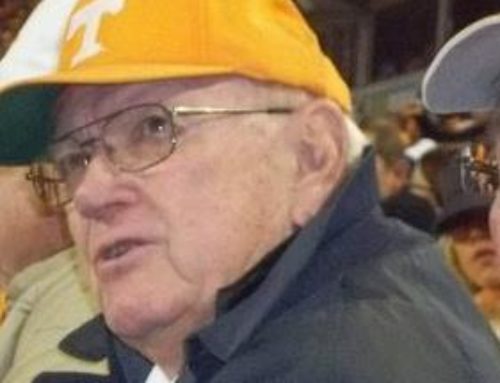Author’s Note: If you haven’t done so already, read the prologue to the story here. The entire book will be released soon but because so many have asked, here is another chapter.
Chapter 1 – Political Seeds
I’m not sure who first coined the well-known phrase, “You can’t take the politics out of politics,” but I’ve repeated it thousands of times. Like it or not, politics plays a pivotal role in our daily lives, and for those of us who choose to be involved, it’s a lifestyle — not an occupation.
My immediate family was always politically engaged despite the fact neither of my parents held elected office or were involved in day-to-day political activities. My paternal great-grandfather, W.D. Jopling, nicknamed “The Old Red Fox,” held multiple offices in McNairy County, Tenn., concurrently in the mid to late 1800s, serving as Constable and Justice of the Peace. He was the Brigadier General of the local confederate militia from 1860-1862, however, after the battle of Shiloh, Union troops occupied most of Tennessee for the remainder of the war.
Blessed to be born and raised in the South, I originate from a long line of what were commonly known as “Dixiecrats,” or southern Democrats with conservative leanings – “conservative” being defined by the era or decade.
My great uncle, Jess Lanier, was the Mayor of Bessemer, Alabama for sixteen years and was long thought of as a successor to Alabama governor George Wallace in the late 1960s. Undoubtedly the best and most successful elected official in our family, he was the quintessential, southern politician. He was my maternal grandfathers brother and one of six children born and raised in North Alabama. As his brother and my granddaddy, Charner “Red” Lanier would tell, Uncle Jessie played minor league baseball with the Decatur Rinky-Dinks, later moving to Bessemer in the early 1940’s to start a radio station. In 1954 he ran and lost his first mayoral race by 27 votes, later winning a special election to fill the seat when the incumbent mayor died in office.
An imposing man at 6’5” with a gregarious laugh and a hand large enough to cover your back when he slapped it for good will and votes, Uncle Jessie was an engaging campaigner, handing a diamond ring to every female he encountered. Knowing the rings were fake never mattered. Women kept them for years and upon receiving one, were as excited as a child finding a toy at the bottom of a Cracker Jack box. When his wife, my Aunt Odyce, was asked how she felt about her husband placing rings on the fingers of adoring women, she simply smiled and flashed the one caret wedding ring on her left hand. “Oh honey, it doesn’t matter, as long as I’m the only woman who has the real deal.”
Aside from the typical mayoral accomplishments of building schools (one later named Jess Lanier High School), streets and municipal buildings, some of Uncle Jesse’s more notable political accomplishments were serving as a delegate to the 1964 and 1972 Democratic National Conventions and having to lead Bessemer during the racial unrest and school integration that challenged many southern cities at the time. His political skills were honed and polished by the south and its gentile, yet spirited manner. I know Uncle Jessie would have been proud of my political success despite the differences in our party affiliation.
One of my earliest political memories was attending an election night victory party in Nashville in the mid-1970s. It was electric. People were everywhere — laughing, talking, and looking forward to a tomorrow as if none had existed before. Their candidate had won and he was going to make the world, at least the state—a better place to live. Such is the case at any victory party, whether it’s your neighbor who was just elected to the school board or a presidential soiree at the Mayflower Hotel in Washington D.C. It’s all consuming, and I loved it from that first moment.
It could be said that my political career began when I was elected vice president of our student body my senior year of high school. However, I didn’t express any further interest in politics until my late 20’s. While attending a sales meeting in California with Allergan pharmaceuticals in 1988, I found myself being the only professed Democrat at a dinner that had to defend Michael Dukakis, the Democratic presidential candidate. Why was I a Democrat? Because my family had always been Democrats. I had no idea what I was talking about and did a horrible job representing his views. At that moment I vowed never again to be defenseless in a political conversation and committed myself to learn more about government and our nation’s political parties. Within the year it was obvious that my ideological leaning were tilted more toward conservative positions and from then on considered myself a Republican. I must admit it wasn’t until 1992 that I admitted to my parents I had crossed lines, a revelation my brother had confessed to many years earlier when he began his military service during the Carter era. Being a Republican was no small declaration in our home. During my childhood, I fondly recall Daddy teaching our poodle to roll over on her back, paws pointed skyward, asking in a specific harsh tone, “Tina, would you rather be a Republican or a dead dog?” But, even my Dad could only take so much of President Clinton’s first-term policies and would say a few years later, “I never left the Democratic Party, but they sure did leave me.” That was a common response for many southern “Dixiecrats” at the time.
In the spring of 1990 and having lived in Overland Park, Kansas for three years, I moved backed to Tennessee because I dearly missed the South. Within two weeks I landed a great job in Memphis and soon after my interest in politics began to grow. Weeks before the 1992 general elections, a friend suggested in attend a Young Republicans meeting. I called the local club chairman, Robert Meyers, and told him I was interested in joining and may have an interest in elected office. He gave me the meeting time and date, and I attended my first gathering within a week. Only months later I attended my first Young Republican national convention and had a blast. I was hooked. More importantly, I met many YR’s from across the nation I would work with in the years ahead. One was an enthusiastic and savvy political operative from California by the name of Kevin McCarthy. Kevin and I rose through the national together and served as YRNF officers from 1997-1999 when he was Co-Chairman and I was Vice Chairman. He later went on to serve as national YR chairman and was elected to the California Assembly in 2000. If the name rings a bell its because Kevin is currently the Majority Leader in the U.S. House of Representatives and came close to being Speaker of the House. It’s indeed a small world.
I formed hundreds of other relationships during those early years, including meeting my first wife, Judy, in November 1992. We dated only a few months prior to our marriage in July 1993. Our union was short; we only lived under the same roof for seven months before we separated. The reality was we should have never married. It should have simply been a break up of a dating couple. Yet during our divorce, I learned the harsh lessons of lies and negative press.
During my first political race for Shelby County Commission in 1998, one of my opponents dug up a complaint Judy had filed against me after an argument one evening. However, when the local newspaper ran the story, they neglected to report that she had dismissed complaint in Judge Robert Lanier’s court (no relation). It wasn’t the reason I lost, but the story didn’t help my race. It later resurfaced in July 2009 when news of my affair became public. When contacted by a reporter, Judy didn’t miss the opportunity to pounce on me once again. Time and distance doesn’t mellow some people.
Even though my first marriage lasted only a few months, I was distraught that the vows “for better or worse” were broken. Would God ever forgive me for breaking such a promise? It wasn’t the last time I would ask Him this question. The few months it took us to divorce were difficult, but when it ended and to help take my mind off this failure, I immediately jumped back into politics. The 1994 campaign season was already in full swing and I was heavily involved in the local Republican Party, volunteering in several primary and general election races. One such race was the Republican primary for Congress in east Shelby County. Many outstanding candidates were running, but I ended up volunteering for Charles Salvaggio, who at the time was mayor of Germantown. Charles was popular and a hard worker. He rose through the ranks and into local politics by taking on the political establishment and winning against the odds. I liked his style. Charles owned a door and frame company and still performed much of the physical work himself. An accident with a saw cut off part of every finger on his left hand, starting with the tip of his index finger and going at an angle until only a small portion of his little finger was left. Every now and then Charles would joke about it and demonstrate his work ethic by showing off his missing fingers. Soon, some of the other candidates were talking about how their granddaddy, uncle, or long lost cousin had lost a finger, hand, or heck, even an entire limb from working in the sawmills or cotton gins of the rural south. Politicians never want to be outdone by their rivals.
I was attracted to his campaign for many reasons, but the main one sat at the front desk near the window of the campaign headquarters. I recall vividly how she looked sitting at her desk. Although she was 13 years my junior and still in college, she was simple and cute, with long wavy black hair and an engaging smile. I only spoke to her a couple of times, mainly to pick up volunteer packets for election day poll watchers, but I remember standing in a doorway one day looking at her and thinking, “How could I ever meet someone like her?” I learned her name was Kristi Pruitt, and she was a student at Millsaps College in Jackson, Mississippi. Four years later she would become my wife and at the time, my most important political ally and the mother of our two wonderful children.
When Mayor Salvaggio lost the GOP primary that August, I turned my attention to volunteering for a little known Nashville heart surgeon who was running for the U.S. Senate. Bill Frist would later serve as the Republican Senate Majority Leader and was considered a Presidential contender in 2006. The Frist campaign was exciting. Under the guidance of campaign extraordinaire Tom Perdue’s aggressive and brilliant management, Frist won a six-man primary that included first-time candidate Bob Corker and steamrolled the powerful incumbent Senator Jim Sasser in the 1994 general election. While the victory was sweet, the relationships I formed during that time were invaluable. Annabel Woodall was in charge of the Frist campaign locally and a close Frist confidant. For years she had volunteered in dozens of political campaigns and, along with her husband, “Dr. Jess,” were a fixture in the local medical and political communities. Annabel was petite, hard charging and one of the kindest people I’ve ever met. She took an instant liking to me and through most of my political career, I considered her a second mother. When she heard some of the rumors surrounding my recent marital woes, she wasted no time in getting the facts out of me because that was her style. She pulled me completely into the campaign structure in Shelby County and often had me drive Bill around in her car when he was in town. We became good friends.
The result of our efforts and the thousands of other volunteers was a super sweep for Republicans in 1994. Personally, I felt a phenomenal sense of renewal and looked forward to what the future promised. I was 32 years old and hoped that I too could have a future in elected office. In early March 1995, I was recommended to the Frist organization as someone who could be the field representative in their Memphis office and after a short interview process, I was offered the job and accepted it immediately. Around this time, Kristi’s dad, an alderman in Germantown, asked if Kristi could volunteer in the Senator’s Memphis office during her summer break. Kristi was one of two volunteers we had come in occasionally to help answer the phone and perform office work. Although she was about to turn 20 at the time, Kristi was and always has been mature for her age.
Born to a then unwed 15-year-old girl in Vero Beach, Florida, Gary and Ronnie Pruitt adopted Kristi when she was only a few days old and raised her as their only child. As a local elected official, Gary was deeply involved in community activities, and Kristi was always listening to conversations about local government and politics. Kristi became engaged in student government at Germantown High School and, to the surprise of no one, was a political science major at Millsaps. She and I developed an instant and deep relationship and both later remarked how much we were attracted to each other from the moment we met. When my Mom came to town that summer to take me out for my birthday, she asked Kristi to join us. The invitation was immediately accepted. Two weeks later, on her birthday, we shared our first kiss.
Working for Senator Frist put me front and center in local Republican Party politics. In a multi-county region with the outlying area or Memphis as my primary focus, I attended hundreds of events on behalf of the senator. The experience in dealing with local elected officials and business leaders would come in handy once I secured an elected position but it was the excitement of being involved in such an important movement that drove my adrenalin to new levels. I loved the rush of politics more and more each day. It was now my drug of choice.
Being constantly involved in the local and state Young Republicans chapters gave me the opportunity to run for Young Republican State Chairman in the fall of 1995. I ran against another candidate from East Tennessee, and it was the first contested election for chairman since 1982. My hometown of Memphis was the site of the convention, and it was an extremely close and hard-fought contest. In one of the best-attended conventions in years, I won by a narrow six-vote margin. It was there that Kristi and I learned the art of counting votes. Never count someone in your column unless you are certain beyond a shadow of a doubt that they are voting for you and only you on that particular day and at that exact moment. Count everyone else as a no vote, and then work on getting enough solid votes to win. On Election Day Matt King, who would later become chief of staff to Lieutenant Governor Ron Ramsey, Susie Alcorn, and Kristi counted votes in the bathroom of our hotel suite to predict the outcome of my race, using the format I described. It would serve us all well in the years ahead. Counting votes and relationships is an art and not a science. I never forgot that lesson.
During the summer of ‘95, Kristi and I were inseparable but by mid-August she was preparing to return to Millsaps to begin her junior year in college. The day Kristi left, I felt as if our three-month relationship would slowly evaporate – that it would be separated by distance and distraction. She would be engrossed in classroom and sorority activities while I had my work and politics to keep me occupied. On the eve of her return, we went out to dinner and she was unusually quiet, more solemn than her typical self. When I dropped her off at her parent’s home that evening, we stood in her driveway, preparing to say goodbye. It was a warm August night, with humidity as thick as molasses. Standing under the light next to the garage entrance, we held each other close and were lost in each other’s eyes. We didn’t say much because there wasn’t much to say. It had been a wonderful summer journey and neither one of us wanted it to end. As I held her around her waist, her arms resting on my shoulders, Kristi’s head hung low as tears began to filter down her red cheeks. I had fallen for her and the feeling seemed mutual. I tried to tell her everything would be okay and how much I enjoyed spending time with her that summer. Our emotions were difficult to contain.
Three and a half months later and during the mid-point of her junior year in college, Kristi told her parents and me she was leaving Millsaps and would transfer to the University of Memphis. The reason was simple; she wanted to be near me. I wanted to be near her but I thought here staying at Millsaps was best. She was active in her sorority and other organizations, but it seemed that our being together was the only extracurricular activity she wanted.
For the next several years, I followed my passion with Kristi by my side. We were rarely apart and both honed our political skills. Weekends were spent traveling the state, bouncing from one political function to another including attending the1996 Republican National Convention in San Diego, Calif.
We were well on our way to a bright and successful future and nothing was going to stand in our way.






Can’t wait for the next chapter